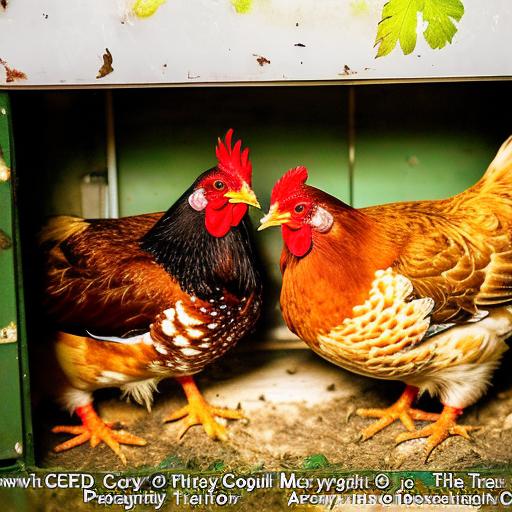Maintaining a consistent temperature in a chicken coop is crucial for the health and well-being of the chickens. Chickens are sensitive to temperature changes and can suffer from heat stress or cold stress if the temperature is not properly regulated. In extreme cases, these temperature fluctuations can even be fatal for the birds. Therefore, it is essential for chicken owners to understand the importance of temperature control in their coops.
Temperature affects chickens in various ways. Extreme heat can cause chickens to become dehydrated, leading to decreased egg production and even death. On the other hand, extreme cold can cause chickens to suffer from frostbite and other health issues. Additionally, temperature fluctuations can cause stress and anxiety in chickens, which can negatively impact their overall well-being. Therefore, maintaining a consistent and comfortable temperature in the chicken coop is vital for the health and happiness of the birds.
Keeping Chickens Comfortable: Why a Heater is Necessary
The ideal temperature range for chickens is between 50-80 degrees Fahrenheit (10-27 degrees Celsius). This range ensures that the chickens are neither too hot nor too cold, allowing them to thrive and lay eggs consistently. However, maintaining this temperature range can be challenging, especially during extreme weather conditions.
A heater is necessary in a chicken coop to maintain the ideal temperature range for the birds. During cold winter months, a heater can provide warmth and prevent the chickens from suffering from cold stress or frostbite. Similarly, during hot summer months, a heater can help cool down the coop and prevent heat stress in the chickens. By using a heater, chicken owners can ensure that their birds are comfortable and healthy throughout the year.
The Benefits of Using a Heater in Your Chicken Coop
Using a heater in your chicken coop offers several benefits. Firstly, it improves egg production. Chickens require a consistent temperature to lay eggs regularly. By maintaining the ideal temperature range with a heater, chicken owners can increase egg production and ensure a steady supply of fresh eggs.
Secondly, a heater helps prevent health problems in chickens. Extreme temperatures can weaken the immune system of the birds, making them more susceptible to diseases and infections. By providing a comfortable and consistent temperature, a heater can help boost the chickens’ immune system and reduce the risk of health issues.
Furthermore, a heater promotes happier chickens. Temperature fluctuations can cause stress and anxiety in chickens, leading to aggressive behavior and decreased overall well-being. By using a heater to maintain a comfortable temperature, chicken owners can keep their birds calm and content, resulting in happier and more docile chickens.
Happy Hens: How a Heater Can Improve Their Mood and Behavior
Temperature plays a significant role in the mood and behavior of chickens. Extreme heat or cold can cause stress and anxiety in the birds, leading to aggressive behavior and decreased overall well-being. Chickens that are stressed or anxious may exhibit behaviors such as feather pecking, cannibalism, or reduced egg production.
By using a heater to maintain a comfortable temperature in the chicken coop, chicken owners can help keep their birds calm and content. A consistent temperature reduces stress levels in chickens, resulting in improved mood and behavior. Happy hens are more likely to get along with each other, lay eggs regularly, and exhibit healthier behaviors.
Better Egg Production: How Temperature Control Can Increase Egg Laying
Temperature control is crucial for maximizing egg production in chickens. Chickens require specific environmental conditions to lay eggs consistently. Extreme temperatures can disrupt their reproductive cycle and decrease egg production.
During cold weather, a heater can provide warmth to the chickens, ensuring that they are comfortable enough to lay eggs regularly. Similarly, during hot weather, a heater can help cool down the coop and prevent heat stress in the birds, allowing them to continue laying eggs.
By maintaining a consistent and comfortable temperature in the chicken coop, chicken owners can increase egg production and ensure a steady supply of fresh eggs.
The Science Behind Temperature Control in a Chicken Coop
The science behind temperature control in a chicken coop lies in the metabolic rate of the birds. Chickens are warm-blooded animals, meaning they can regulate their body temperature to some extent. However, extreme temperatures can put a strain on their metabolic system.
When chickens are exposed to cold temperatures, their metabolic rate increases as they try to generate more heat to keep warm. This increased metabolic rate requires more energy, which can lead to decreased egg production and overall health issues.
On the other hand, when chickens are exposed to hot temperatures, their metabolic rate decreases as they try to cool down. This decreased metabolic rate can also lead to decreased egg production and overall health problems.
By using a heater to maintain a consistent and comfortable temperature in the chicken coop, chicken owners can help regulate the metabolic rate of the birds, ensuring optimal health and egg production.
Types of Heaters: Which One is Best for Your Chicken Coop?
There are several types of heaters available for chicken coops, each with its own pros and cons. The choice of heater depends on various factors such as the size of the coop, the climate in your area, and your budget.
One common type of heater is the radiant heater. These heaters emit infrared radiation that warms up the objects and surfaces in the coop, rather than heating the air directly. Radiant heaters are energy-efficient and provide a gentle and consistent heat source for the chickens. However, they can be more expensive than other types of heaters.
Another type of heater is the ceramic heat emitter. These heaters produce heat by converting electricity into heat energy. Ceramic heat emitters are durable and long-lasting, making them a popular choice for chicken owners. However, they can be more expensive to purchase initially.
Additionally, there are also propane heaters available for chicken coops. These heaters use propane gas to generate heat and are often used in larger coops or barns. Propane heaters are efficient and provide a consistent source of heat. However, they require a propane tank and regular refilling, which can be an additional expense.
Safety Precautions: Tips for Using a Heater in Your Chicken Coop
When using a heater in a chicken coop, it is essential to take safety precautions to prevent fires and other hazards. Here are some tips for using a heater safely in your chicken coop:
1. Choose a heater that is specifically designed for use in a chicken coop. Regular space heaters may not be suitable for this purpose.
2. Keep the heater away from flammable materials such as straw or wood shavings. Ensure that there is enough clearance around the heater to prevent any fire hazards.
3. Install smoke detectors and fire extinguishers in the chicken coop as an added safety measure.
4. Regularly inspect the heater for any signs of damage or malfunction. Replace any faulty parts or heaters immediately.
5. Follow the manufacturer’s instructions for installation and operation of the heater.
By following these safety precautions, chicken owners can ensure that their chickens and coops remain safe while using a heater.
Cost-Effective Solutions: How a Heater Can Save You Money in the Long Run
While investing in a heater for your chicken coop may seem like an additional expense, it can actually save you money in the long run. Here’s how:
1. Improved egg production: By maintaining a consistent temperature with a heater, you can increase egg production in your chickens. This means you will have a steady supply of fresh eggs, reducing the need to purchase eggs from the store.
2. Preventing health problems: A heater helps prevent health issues in chickens that can be costly to treat. By providing a comfortable and consistent temperature, you can reduce the risk of diseases and infections, saving on veterinary bills.
3. Longer lifespan: Chickens that are exposed to extreme temperatures may have a shorter lifespan due to the strain on their metabolic system. By using a heater to regulate the temperature in the coop, you can help extend the lifespan of your chickens, reducing the need to replace them frequently.
4. Energy-efficient heaters: Many heaters available for chicken coops are energy-efficient, meaning they consume less electricity or fuel. This can result in lower energy bills in the long run.
When choosing a heater for your chicken coop, consider the initial cost, energy efficiency, and long-term savings to find a cost-effective solution that suits your budget.
Winter Weather: Preparing Your Chicken Coop for Cold Temperatures
In addition to using a heater, there are other steps you can take to prepare your chicken coop for cold temperatures. Here are some tips:
1. Insulate the coop: Proper insulation helps retain heat and keeps the coop warm during cold weather. Use insulation materials such as foam boards or straw bales to insulate the walls and roof of the coop.
2. Seal any drafts: Check for any gaps or cracks in the coop that may allow cold air to enter. Seal these drafts with caulk or weatherstripping to keep the coop airtight.
3. Provide bedding: Use thick bedding such as straw or wood shavings on the floor of the coop. This provides an additional layer of insulation and helps keep the chickens warm.
4. Use heated waterers: Waterers can freeze in cold temperatures, making it difficult for chickens to stay hydrated. Invest in heated waterers that prevent freezing and ensure a constant supply of water for the birds.
5. Increase ventilation: While it may seem counterintuitive, proper ventilation is essential even in cold weather. Good ventilation helps remove moisture and ammonia from the coop, preventing respiratory issues in the chickens.
By combining these winter weather preparations with a heater, you can ensure that your chickens stay warm and comfortable during the cold months.
The Benefits of a Heater for Your Chickens and Your Wallet
In conclusion, maintaining a consistent temperature in a chicken coop is crucial for the health and well-being of the birds. Temperature control affects various aspects of chicken life, including egg production, mood, behavior, and overall health. By using a heater in your chicken coop, you can provide a comfortable and consistent temperature for your birds, resulting in improved egg production, happier chickens, and cost savings in the long run.
When choosing a heater for your chicken coop, consider factors such as the size of the coop, climate in your area, and your budget. Additionally, take safety precautions to prevent fires and other hazards when using a heater. By combining temperature control with other winter weather preparations, you can ensure that your chickens stay warm and healthy throughout the year.
Investing in a heater for your chicken coop is not only beneficial for your chickens but also for your wallet. By improving egg production, preventing health problems, and increasing the lifespan of your chickens, a heater can save you money in the long run. So don’t hesitate to invest in a heater for your chicken coop and provide your birds with the comfort they deserve.
Meet Walter, the feathered-friend fanatic of Florida! Nestled in the sunshine state, Walter struts through life with his feathered companions, clucking his way to happiness. With a coop that’s fancier than a five-star hotel, he’s the Don Juan of the chicken world. When he’s not teaching his hens to do the cha-cha, you’ll find him in a heated debate with his prized rooster, Sir Clucks-a-Lot. Walter’s poultry passion is no yolk; he’s the sunny-side-up guy you never knew you needed in your flock of friends!








